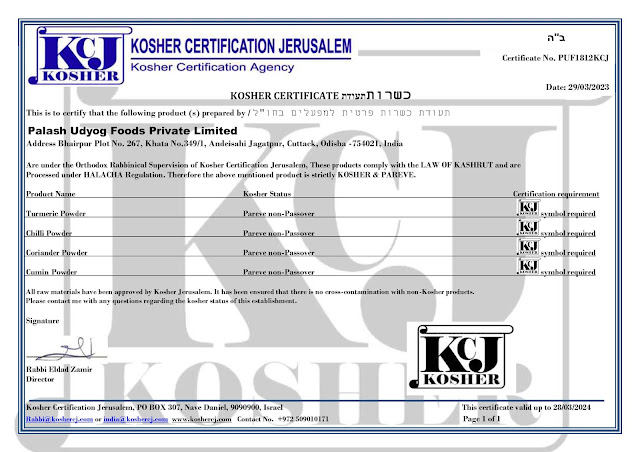Meera Spices in India (Palash Udyog Pvt. Ltd ) is Certified with Kosher Certificate , which is an approval that the Spices Manufactured are Kosher Certified.
What is Kosher Certificate?
A Kosher certificate, also known as a Kosher symbol or hechsher, is a certification granted to a food product, ingredient, or establishment that meets the requirements of Jewish dietary laws, known as Kashrut. Kashrut specifies what foods can be consumed by Jewish people and how those foods must be prepared and handled.
Kosher certification ensures that the food or product complies with these dietary laws and has been prepared according to the necessary standards. The certification is typically granted by a recognized Kosher certification agency or authority, which may vary depending on the location.
Having a Kosher certificate allows Jewish individuals and communities to identify which products are suitable for their consumption.
The certification process involves inspecting the ingredients, production methods, and facilities to ensure they meet the standards of Kashrut. This includes verifying that the product does not contain forbidden ingredients, such as certain types of meat, shellfish, or mixtures of milk and meat. Additionally, it ensures that the food was prepared using utensils and equipment that have been properly cleansed and designated for Kosher use.
Kosher certificates are usually represented by a symbol or logo on the packaging of the product. There are numerous Kosher certification symbols used by different organizations worldwide. Some well-known symbols include the OU (Orthodox Union), K (OK Kosher Certification), Star-K, and KOF-K, among others.
It's important to note that the specific requirements and standards for obtaining Kosher certification may vary depending on the specific Jewish traditions and practices followed by the certifying authority.
Kosher certificates are usually represented by a symbol or logo on the packaging of the product. There are numerous Kosher certification symbols used by different organizations worldwide. Some well-known symbols include the OU (Orthodox Union), K (OK Kosher Certification), Star-K, and KOF-K, among others.
It's important to note that the specific requirements and standards for obtaining Kosher certification may vary depending on the specific Jewish traditions and practices followed by the certifying authority.
Who needs Kosher Certification? and What are Kosher Certification Benefits ?
Kosher certification provides several benefits for various stakeholders:
Jewish Consumers: Kosher certification enables Jewish individuals to identify products that meet their dietary requirements. It gives them confidence that the food they purchase and consume adheres to the Kashrut laws. Kosher certification allows Jewish individuals to maintain their religious observance and dietary practices.
Food Manufacturers and Retailers: Obtaining Kosher certification can expand market opportunities for food manufacturers and retailers. By certifying their products as Kosher, they can appeal to a broader customer base, including Jewish consumers who specifically seek out Kosher products. This certification can enhance consumer trust, increase sales, and open doors to new distribution channels.
Food Service Establishments: Restaurants, catering services, and other food service establishments can benefit from Kosher certification by attracting Jewish clientele. Being certified as Kosher helps assure Jewish customers that the establishment follows appropriate guidelines and meets the necessary standards in preparing their meals.
International Trade: Kosher certification can facilitate international trade, particularly with Jewish communities worldwide. Many countries have import regulations that require Kosher certification for specific food products. Having a recognized Kosher certification can make it easier for exporters to access these markets and comply with the necessary import requirements.
Quality and Safety Standards: Kosher certification often involves rigorous inspections and audits of ingredients, production processes, and facilities. This scrutiny can help ensure that food products meet certain quality and safety standards. The Kosher certification process may involve verification of proper handling, cleanliness, and supervision, which can contribute to improved overall product quality.
Consumer Confidence: Kosher certification is not limited to Jewish consumers. Non-Jewish individuals may also perceive Kosher-certified products as having higher standards of quality, cleanliness, and food safety. Some consumers associate Kosher certification with specific attributes, such as strict sourcing practices, thorough inspections, and ethical considerations, leading to increased consumer confidence in the product.
Jewish Consumers: Kosher certification enables Jewish individuals to identify products that meet their dietary requirements. It gives them confidence that the food they purchase and consume adheres to the Kashrut laws. Kosher certification allows Jewish individuals to maintain their religious observance and dietary practices.
Food Manufacturers and Retailers: Obtaining Kosher certification can expand market opportunities for food manufacturers and retailers. By certifying their products as Kosher, they can appeal to a broader customer base, including Jewish consumers who specifically seek out Kosher products. This certification can enhance consumer trust, increase sales, and open doors to new distribution channels.
Food Service Establishments: Restaurants, catering services, and other food service establishments can benefit from Kosher certification by attracting Jewish clientele. Being certified as Kosher helps assure Jewish customers that the establishment follows appropriate guidelines and meets the necessary standards in preparing their meals.
International Trade: Kosher certification can facilitate international trade, particularly with Jewish communities worldwide. Many countries have import regulations that require Kosher certification for specific food products. Having a recognized Kosher certification can make it easier for exporters to access these markets and comply with the necessary import requirements.
Quality and Safety Standards: Kosher certification often involves rigorous inspections and audits of ingredients, production processes, and facilities. This scrutiny can help ensure that food products meet certain quality and safety standards. The Kosher certification process may involve verification of proper handling, cleanliness, and supervision, which can contribute to improved overall product quality.
Consumer Confidence: Kosher certification is not limited to Jewish consumers. Non-Jewish individuals may also perceive Kosher-certified products as having higher standards of quality, cleanliness, and food safety. Some consumers associate Kosher certification with specific attributes, such as strict sourcing practices, thorough inspections, and ethical considerations, leading to increased consumer confidence in the product.

